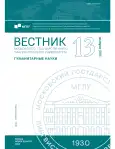THE CONSTITUTIVE FEATURES OF DISCOURSE MARKERS IN FRENCH
- Autores: Zueva E.S.1
-
Afiliações:
- Moscow State Linguistic University
- Edição: Nº 13(894) (2024)
- Páginas: 54-60
- Seção: Linguistics
- URL: https://journal-vniispk.ru/2542-2197/article/view/291497
- ID: 291497
Citar
Resumo
The objective of the current study is to present a overview of the main features of discourse markers, a linguistic phenomenon having a rich pragmatic functionality and playing a significant role in the organization of discourse, and therefore arousing the growing interest of modern researchers. The analysis in the study is based on spontaneous French speech - the author examines some excerpts from Youtube videos in French, as well as some authentic examples of written speech. The study resulted in the identification of the fundamental features of discourse markers in various aspects (phonetic, semantic, grammatical, syntactic).
Palavras-chave
Sobre autores
Elena Zueva
Moscow State Linguistic University
Autor responsável pela correspondência
Email: lenok.zs98@gmail.com
Post-graduate Student, Department of lexicology and stylistics of the French Language, Faculty of the French Language
RússiaBibliografia
- Murashkovskaya, E. M. (2014). Podhody k issledovaniyu diskursivnyh markerov = Approaches to discourse markers’ study. Vestnik of Moscow State Regional University. Series: Linguistics, 5, 53–59. (In Russ.)
- Ivanov, V. D. (2020). Funkcii diskursivnyh chastic v nemeckom yazyke = The functions of discourse markers in German: PhD in Philology. Moscow. (In Russ.)
- Tuleuova, D. A. (2022). Funkcional’nyj potencial diskursivnyh markerov = The functional potential of discourse markers. Eurasian humanitarian Journal, 4, 59–68. (In Russ.)
- Dostie, G. (2012). Ben en tant que collocatif discursif. Travaux de linguistique, 2(65), 105–122.
- Dostie, G., Pusch, C. D. (2007). Présentation. Les marqueurs discursifs. Sens et variation. Langue française, 154(2), 3–12.
- Beeching, K. (2002). Gender, politeness and pragmatic particles in French (Pragmatics & Beyond New Series, vol. 104). Amsterdam & Philadelphia: John Benjamins.
- Hansen, M.-B. M. (2022). Les pragmatèmes. Manuel d’étymologie lexicale romane. Manuels de linguistique romane (MLR)) de Gruyter, Walter GmbH & Co. The University of Manchester.
- Anscombre, J.-C., Donaire, M. L., Haillet, P. P. (2013). Opérateurs discursifs du français. Eléments de description sémantique et pragmatique (Sciences pour la communication, vol. 105). Lausanne, Switzerland: Peter Lang Verlag.
- Apothéloz, D., Nowakowska, M. (2013). “Déjà” et le sens des énoncés. Marqueurs temporels et modaux en usage. Cahiers Chronos (pp. 355–386).
- Rey, J. (1999). Approche argumentative des textes scientifiques: la traduction de or en espagnol. Meta, 44(3), 411–428.
- Heine, B. (2013). On discourse markers: Grammaticalization, pragmaticalization, or something else? Linguistics, 51(6), 1205–1247.
- Kogut, S. V. (2016). Diskursivnye markery v pis’mennom nauchnom diskurse = Discourse markers in written scientific discourse. Siberian philological journal. Linguistics and literature studies, 2, 157–163. (In Russ.)
- Viktorova, E. Yu. (2014). Sinkretizm diskursivnyh slov = The syncretism of discourse words. News of Saratov University. New series. Series: Phylology. Journalism, 3, 14–21. (In Russ.)
- Vishnevskaya, G. M., Zagorodnova, O. A. (2015). Metayazykovye svojstva diskursivnyh markerov v razlichnyh stilyah rechi = Metalinguistic features of discourse markers in different styles of speech. Verhnevolzhski philological bulletin, 2, 65–69. (In Russ.)
- Chanet, C. (2003). Fréquence des marqueurs discursifs en français parlé: quelques problèmes de méthodologie. Recherches sur le français parlé, 18, 83–107.
- Eshieva, T. Z. (2021). Pragmaticheskie funkcii diskursivnyh markerov = The pragmatic functions of discourse markers. In The digest of articles of the II International scientific and practical conference (pp. 120–123). Penza. (In Russ.)
- Fraser, B. (1999). What are discourse markers? Journal of Pragmatics, 31(7), 931–952.
- Dostie, G. (2004). Pragmaticalisation et marqueurs discusifs: Analyse sémantique et traitement lexicographique. Brussels: De Boeck/Duculot.
- Sandal, K. L. (2016). “And, like, they said ... well, you know”: A corpus-based study of the discourse markers ‘like’ ‘well’ and ‘you know’ in spoken Norwegian learner language and British English. Thesis. University of Oslo.
- Hansen, M.-B. M. (1998). The semantic status of discourse markers. Lingua, 104(3–4), 235–260.
Arquivos suplementares










